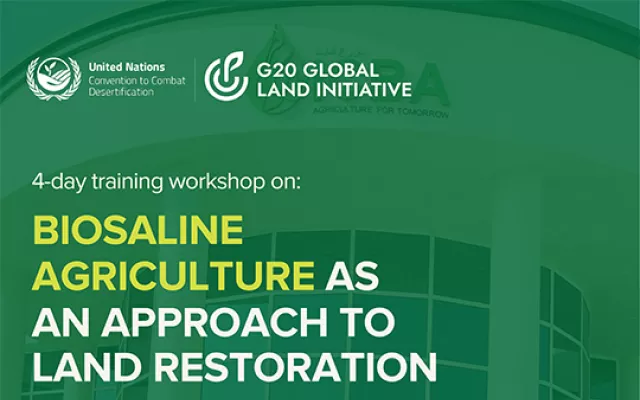Innovations in Agriculture and Food Security Highlighted at IDB Annual Meeting
20 May 2013
Dushanbe, Tajikistan – The International Center for Biosaline Agriculture (ICBA) and the Islamic Development Bank (IDB) co-organized a forum to present and discuss policy and technological innovations in agriculture and food security during the 38th Annual Meeting of IDB in Dushanbe, Tajikistan, on 20 May 2013. This cooperation reflects more than a decade of strong partnership between ICBA and IDB.
The Forum was designed to highlight a selection of recent innovations in policy and technology to tackle issues affecting food security. With a wide selection of panelists from the private and public sector, from local, regional and global perspectives and moderated by Mr. Malcolm Taylor, the Forum attracted an audience of over 200 people.
In his welcome remarks, H.E. Murodali Alimardon, Deputy Prime Minister of Tajikistan, said "in recent years climate change, natural disasters, and [the economic] crisis had a negative impact on food security in the country. Arable and irrigated land in Tajikistan is limited since 93% of the country is covered by mountains and crop land is around 3.2% and out of which 81% is for seasonal pastures”. He added, “There is a need to accelerate technical and scientific development and diversification of agricultural sector.”
Noted experts from the policy perspective included Jeffrey Sachs, Director of The Earth Institute at Colombia University; H.E. Dr. Kosimov Kosim, Minister of Agriculture of Tajikistan; Dr. Sergey Kiselev, Director General of Eurasian Center for Food Security in Moscow; Demba Ba, Director of Agricultural and Rural Development in IDB, and Dr. Ismahane Elouafi, Director General of ICBA. The panel agreed on the need for sustained global recognition and action on food security issues through the UN, G8 and G20 deliberations, that changes in behavior will be necessary and that policy and institutions (both public and private) have a role to play.
The second panel tackled technical solutions now being designed and implemented. Hans Hassle, the CEO of Plantagon, a company specializing in urban agriculture, said that to grow large amounts of food in urban environments we will need to go vertical, a technology his company specializes in. Chang Hoo Chun, Senior Advisor at Gyeonggi Agricultural Research and Extension Services spoke about his organizations success in precision agriculture. Innovation is seed production and equipment and adapting these to local environments was explained by Stephen Hill, Managing Director of Kimseed International, with explanation on innovations in optimizing resources described by Dr. Shoaib Ismail, Senior Scientist at ICBA. Other innovations from a regional and local level were provided Dr. Hukmatullo Akhmadov, President of Tajik Academy of Agricultural Sciences and Dr. Serikbay Keninbaev, former Director General of Kasagro.
In his concluding remarks, Mr. Fawzi Al Sultan, Chairman of the ICBA Board of Directors noted that pressures on food security are not going away. He stressed that increased investment in agricultural research is fundamental and that investment is needed to scale out research to address the big development challenges we face. He concluded that the issues cannot be solved overnight but there is a need to work faster.










